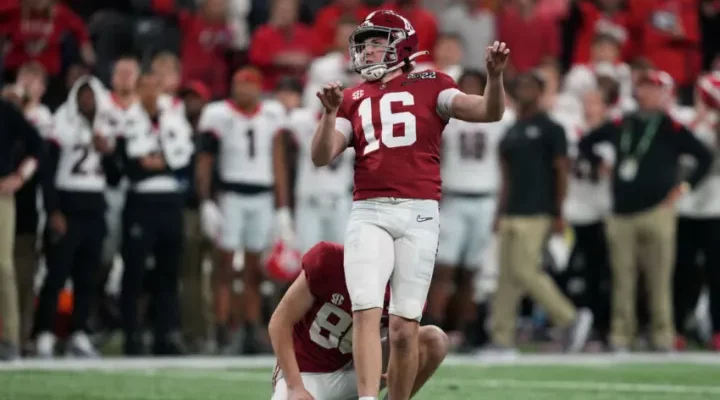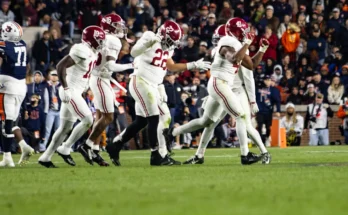Alabama Faces Rare Uncertainty on Special Teams With Vacancies at Both Kicker and Punter Heading Into the 2025 Season
For the first time in several years, Alabama football enters fall camp with genuine uncertainty at two of its most overlooked but essential positions—kicker and punter. The program that built its modern dynasty on five-star dominance and plug-and-play depth is now searching for stability in the game’s most specialized roles. With longtime punter James Burnip out of eligibility and kicker Will Reichard now in the NFL, the Crimson Tide are navigating unfamiliar territory: replacing two of the most consistent legs in college football at the same time.
This moment of special teams vulnerability arrives during a transitional period for Alabama as a whole. The departure of Nick Saban after the 2023 season and the arrival of Kalen DeBoer have already ushered in a new era in Tuscaloosa. And while the Tide’s offensive and defensive retooling has garnered most of the offseason headlines, the battles at kicker and punter could prove just as consequential in tight SEC games and potential College Football Playoff showdowns.
For years, Alabama’s special teams—once maligned during the early Saban era—became a quiet strength. Reichard was nearly automatic, finishing his college career as the NCAA’s all-time leading scorer and setting the bar for consistency and composure. Burnip, meanwhile, was a steady Australian presence who gave the Tide crucial field-position advantages in big moments. Losing both in the same offseason is not just inconvenient—it’s potentially destabilizing.
Now, the burden falls on a trio of largely unproven legs. For punting duties, Alabama will turn to redshirt freshman Jack Martin and true freshman Keegan Morgan. Martin, a walk-on from Dothan, Alabama, saw limited action last year but has reportedly shown a powerful leg in spring practices. Morgan, a signee from Georgia, comes in with a reputation for hang time and directional punting, but high school success doesn’t always translate immediately to the SEC stage. With no returning experience and no clear favorite as of July, the punter battle is expected to extend well into fall camp.
The kicking competition is slightly more defined but just as unproven. Conor Talty, a redshirt freshman from Illinois, appears to be the front-runner. He was ranked the No. 1 kicker in the 2023 class by several services and has drawn comparisons to former Alabama greats in terms of technique and mental approach. However, Talty has yet to attempt a kick in live college action. Behind him is true freshman Graham Nicholson, a late addition to the 2024 class who was recruited more for depth than immediate contribution. Unless Talty falters in fall camp, it’s likely his job to lose—but even so, he’ll be asked to replace one of the most reliable kickers in SEC history.
Alabama’s coaching staff has taken a methodical approach to these vacancies. Special teams coordinator Jay Nunez, who came with DeBoer from Washington, has been given the full backing of the new regime to re-evaluate every aspect of the kicking game—from snap-to-kick timing to pressure situational drills. Nunez, known for his analytical approach, has reportedly implemented performance tracking in practices that mirrors NFL-level data analysis. Each kick and punt is charted for hang time, distance, trajectory, and situational context, helping the staff make informed decisions on who truly performs under pressure.
Still, no amount of data can simulate the kind of tension that defines SEC Saturdays. It’s one thing to make a 47-yarder in front of 50 teammates at practice; it’s another to do it in front of 100,000 fans in Death Valley with the game on the line. That’s the psychological hurdle Alabama’s young specialists must clear, and it’s one that no algorithm can predict.
DeBoer, for his part, has expressed cautious optimism about the state of special teams. In his spring media availability, he praised the competitiveness of the specialists and emphasized the importance of internal growth rather than rushing to the transfer portal. That patience could be tested quickly. If early struggles emerge in non-conference play or against Tennessee and Georgia in October, fans and media will question whether Alabama did enough in the offseason to secure veteran help.
There were options in the portal. Several proven Power Five kickers and punters made moves this spring, and Alabama reportedly evaluated a few. But in the end, DeBoer and Nunez opted to stick with the current roster, placing faith in development and continuity. It’s a risk—and one that could be magnified if special teams mistakes swing a key game.
Of course, Alabama still has advantages. The Crimson Tide boast one of the SEC’s best long snappers in Kneeland Hibbett and have dynamic returners in Kendrick Law and Caleb Downs. Field position could still tilt in Alabama’s favor if the coverage units remain elite. But those elements can’t fully cover for missed field goals or shanked punts in tight games. The margin for error in the SEC West—especially with an expanded 12-team College Football Playoff on the horizon—is slimmer than ever.
There’s also the larger philosophical question: in the post-Saban era, will Alabama continue to invest in special teams as a defining pillar of championship football? Under Saban, that answer was clear. He once famously quipped that “games are often lost, not won” on special teams, and he devoted substantial attention to that third phase of the game. DeBoer, by contrast, comes from a background that emphasized offensive innovation and tempo. Whether that shift in emphasis leads to special teams becoming more of an afterthought remains to be seen.
The answer may hinge not just on this season’s outcomes but on the identity Alabama chooses to build moving forward. If Talty and Martin emerge as dependable pieces, it will affirm the Tide’s confidence in internal development. If they falter, it may prompt a more aggressive future approach in the transfer market, especially as special teams increasingly becomes an area where championship margins are decided.
It’s also worth noting the recruiting implications. Alabama has already extended offers to multiple specialists in the 2025 and 2026 classes, signaling that the program remains committed to bringing in top-tier talent at those positions. But unlike skill players or linemen, it’s rare for a kicker or punter to start immediately and perform at an elite level. Development, both mental and physical, takes time—and time is not always a luxury afforded to a team with national title expectations.
Ultimately, Alabama’s 2025 season could be shaped as much by what happens on fourth down and field goal attempts as by the quarterback battle or defensive play-calling. The Tide may still field a top-five defense and an explosive offense under DeBoer, but championship teams are often separated by the smallest of moments—an end-over-end punt that pins the opponent deep, or a clutch 48-yard field goal with two seconds left.
For the first time in recent memory, Alabama doesn’t have guaranteed answers in those moments. That doesn’t mean the Tide are doomed; far from it. But it does introduce a new layer of unpredictability to a program that has, for so long, thrived on the opposite. In a sport where stability is rare, Alabama’s special teams outlook offers a reminder that even dynasties must evolve—and occasionally, recalibrate.
This fall, all eyes may be on the quarterback competition and the debut of DeBoer’s offense, but those truly attuned to Alabama’s path back to a national title will be watching the sidelines during extra points and fourth downs. Because in a season where every edge counts, the Tide’s search for reliable special teams may be the hidden storyline that defines 2025.



